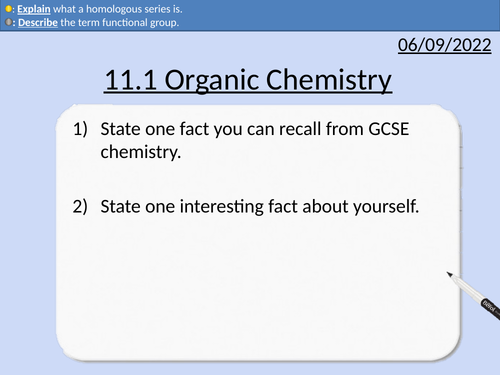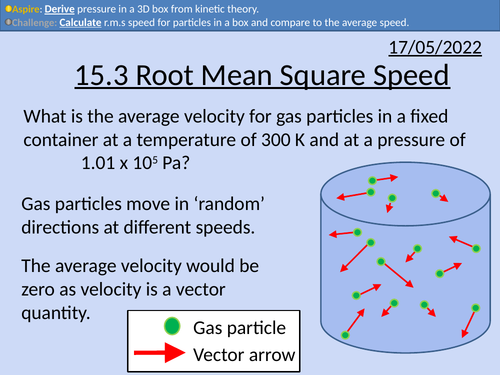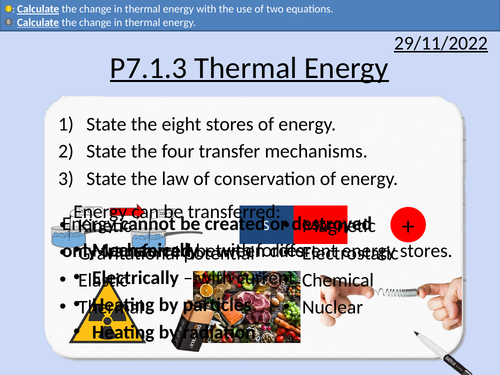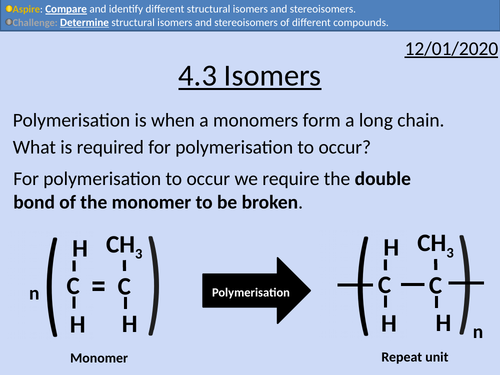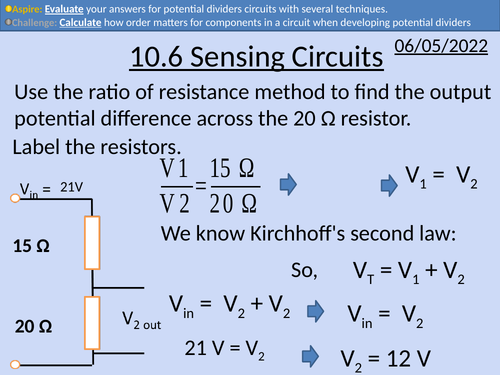497Uploads
167k+Views
71k+Downloads
All resources

OCR A level Physics: Exploring Centripetal Forces
OCR A level Physics: Centripetal Force and the Radian is a part of the Module 5: Newtonian world and astrophysics.
All presentations come with worked examples, solutions and homeworks with answers.

OCR AS Chemistry: Organic Chemistry
OCR AS Chemistry: 11.1 Organic Chemistry
This PowerPoint is a whole lessons included with student activities, animated answers, homework questions with answers provided.
This lesson covers:
Definition of hydrocarbons
What organic chemistry is
Saturated and unsaturated hydrocarbons
Definition of functional groups
Definition of homologous group
Bundle

GCSE OCR Physics P5.1 Wave Behaviour
Resources for P5.1 GCSE OCR Physics Gateway 9-1 Triple and Combined (Higher and Foundation) is covered in this material.
Each lesson includes student activities and full worked answers.
Includes:
Definition of a wave
Mechanical waves
Electromagnetic waves
Transverse waves
Longitudinal waves
Amplitude
Wavelength
Frequency
Time period
Calculating frequency and equation
Relationship between frequency and wavelength when speed is constant.
Calculating time period from frequency with equations
The speed equation
Measuring distance and time
Simple experiment for the speed of sound
Improving experiments
Echoes
Speed of sound experiment with microphones and oscilloscope.
Ray diagrams
Absorption, reflection and transmission
Sonar
Ultrasound
Rearranging equation
Refraction
Relationship between wave speed and wavelength
Structure of the ear.
Frequency range of human hearing.
Explanation of the limited frequency range of humans.
Explanation for hearing deteriorating with age.
Bundle

OCR AS level Chemistry: Alkanes
OCR AS level Chemistry: Alkanes is apart of the Module 4: Core Organic Chemistry and Analysis
All presentations come with worked examples, solutions and homeworks

OCR AS Chemistry: Reactions of Alkenes
OCR AS Chemistry: 13.3 Reactions of Alkenes
This PowerPoint is a whole lessons included with student activities, animated answers, homework questions with answers provided.
This lesson covers:
Alkene addition reactions:
Hydrogen with a nickel catalyst
Halogens
Hydrogen halide
Steam with an acid catalyst
Test for unsaturated alkenes.
Bond enthalpy for sigma and pi bonds.
Bundle

GCSE OCR Physics P5 Waves
Resources for P5 GCSE OCR Physics Gateway 9-1 Triple and Combined (Higher and Foundation) is covered in this material.
Each lesson includes student activities and full worked answers.
Definition of a wave
Mechanical waves
Electromagnetic waves
Transverse waves
Longitudinal waves
Amplitude
Wavelength
Frequency
Time period
Calculating frequency and equation
Relationship between frequency and wavelength when speed is constant.
Calculating time period from frequency with equations
The speed equation
Measuring distance and time
Simple experiment for the speed of sound
Improving experiments
Echoes
Speed of sound experiment with microphones and oscilloscope.
Ray diagrams
Absorption, reflection and transmission
Sonar
Ultrasound
Rearranging equation
Refraction
Relationship between wave speed and wavelength
Structure of the ear.
Frequency range of human hearing.
Explanation of the limited frequency range of humans.
Explanation for hearing deteriorating with age.
Order of the electromagnetic spectrum
Wavelength and frequency relationship
Application of wave speed equation
Rearranging equation
Producing and detecting radio waves
Recall that light is an electromagnetic wave
Give examples of some practical uses of electromagnetic waves in the radio, micro-wave, infra-red, visible, ultraviolet, X-ray and gamma-ray regions
Describe how ultra-violet waves, X-rays and gamma rays can have hazardous effects, notably on human bodily tissues.
Explain that electromagnetic waves transfer energy from source to absorber to include examples from a range of electromagnetic waves
Precautions for ultra-violet waves, X-rays and gamma rays
Careers: Medical Physicist
X-rays
CT scans
Gamma imaging
Thermogram
Magnetic Resonance Imaging
Precautions for using ionising radiation
Law of reflection
Labeling and measuring angles of incidence and reflection
Practical activity instructions - fully animated.
Reflection, absorption, and refraction is affected by wavelength of electromagnetic wave.
Refraction the change of velocity - speed and direction
Magnitude of refraction depending on wavelength
Magnitude of refraction depending on optical density
Refraction practical activity instructions
Wave speed, wavelength, and frequency relationship in refraction
Convex and Concaves lenses
Eyes and corrective lenses
Refraction and wavelength
Focal points for lenses
Determining the type of images produced through a lens
Names of colours for the visible spectrum
Coloured filters
Coloured objects acting as a coloured filters
White light and refracting prism
Refraction and wavelength
Specular reflection
Diffuse scattering
Scattering - Why the sky is blue and milk is white.

OCR AS Physics: Combining Resistors
OCR AS Physics A: Combining Resistors is a part of the Module 4: Electrons, Waves, and Photons. PowerPoint with worked examples and homework.
Rules for adding resistors in series and parallel
Applying adding resistors in series and parallel

OCR AS Physics: Paying for Electricity
OCR AS Physics: Paying for Electricity is a part of the Module 4: Electrons, Waves, and Photons. PowerPoint with worked examples and homework.
Converting time to hours
Using different units for electrical energy
Converting from J to kW hr
Calculating the cost of using different electrical appliances.

OCR AS Physics: Analysing Circuits
OCR AS Physics: Analysing Circuits is a part of the Module 4: Electrons, Waves, and Photons. PowerPoint with worked examples and homework.
Drawing and labeling circuit diagrams
Adding Resistors in Series and Parallel
Ohm’s Law
Kirchhoff’s Laws
The Electrical Power Equation

OCR AS Physics: Internal Resistance
OCR AS Physics: Internal Resistance is a part of the Module 4: Electrons, Waves, and Photons. PowerPoint with worked examples and homework.
Find lost volts and terminal potential difference from a source of emf
Calculate internal resistance of a cell
Calculate internal resistance of a cell with a graph
Calculate EMF of a source

GCSE Physics: Generators
This lesson presentations covers OCR Gateway Physics 9-1 P4.2.4 Generators.
Uses of generators
AC and DC definitions
Structure of dynamos and alternators
Comparing dynamos and alternators.
Plotting graphs for induced potential difference from dynamos and alternators
Commercial generators, 230 V at 50 Hz.

GCSE Physics: Specific Heat Capacity
This presentation covers OCR Gateway Physics 9-1 P1.2.3
Presentation includes:
Definition of SHC
Real life examples of SHC
SHC equation with example
SHC equation questions with worked solutions
Exam question with solution

OCR A level Physics: Specific Latent Heat
OCR A level Physics: Specific Latent Heat is a part of the Module 5: Newtonian World and Astrophysics. The PowerPoint presentation includes worked examples, solutions and a homework.

OCR A level Physics: Root mean square speed
OCR A level Physics: Root mean square speed is a part of the Module 5: Newtonian World and Astrophysics. The PowerPoint presentation includes worked examples, solutions and a homework.

GCSE Physics: Kinetic energy and Work done
This presentation covers OCR Gateway Physics 9-1 P7.1.1b Kinetic energy and Work done.
PowerPoint includes student activities with fully worked answers included.
Work done and kinetic energy equations
Rearranging equations
Mechanical energy transfer and work done
Kinetic store transfered mechanically to a thermal store through brakes.

GCSE Physics: Gravitational and Elastic Energy
This presentation covers OCR Gateway Physics 9-1 P7.1.7 Gravitational and Elastic Energy
Energy transfers with links to sport and PE.
Employer-mentor links with physics and sports
Exam Style Question with worked solutions
Rearranging equations
Practice Questions with worked solutions

GCSE Physics: Work Done, Kinetic and Thermal Energy
This presentation covers OCR Gateway Physics 9-1 P7.1.3 Work Done, Kinetic and Thermal Energy
Comes complete with students activities and fully worked solutions.
Energy transfers to thermal store.
Thermal energy, equation, and specific heat capacity.
Work done equation and kinetic energy equation.
Rearranging equations.
Applying equations.
Student questions with fully worked solutions.

OCR Applied Science: 4.3 Isomers
This PowerPoint presentation with worked examples and student activities covers: Topic 4.3 of Module 1: Science Fundamentals of the OCR Applied Science Spec.
• Stating definitions and comparing structural isomers and stereoisomers.
• Condensed structural formula
• Lines of symmetry for structural isomers
• Cis- and Trans isomers
• Optical isomers as non-superimposable mirror images.
• Wedge and Dash Notation
• Identifying chiral centres (asymmetric carbons)
• Le Bel-van’t Hoff rule
• Determining the maximum number of isomers.

OCR AS Physics: Sensing Circuits
OCR AS Physics: Analysing Circuits is a part of the Module 4: Electrons, Waves, and Photons. PowerPoint with worked examples and homework.
Kirchhoff’s Laws for potential difference
Thermistors and LDRs in sensing circuits
Ratio of resistances and ratio of potential differences
Bundle

OCR AS level Chemistry: Alkenes
OCR AS level Chemistry: Alkenes is apart of the Module 4: Core Organic Chemistry and Analysis
All presentations come with worked examples, solutions and homeworks
Comparing pi-bond (π-bond) and sigma bonds (σ-bonds).
Aliphatic alkenes and alicyclic arrangements of molecules
s, p, d orbitals for electrons
Trigonal planar shape of alkanes leading to 120 degree bond angle.
E/Z isomerism
Conditions for trans- and cis- isomerism
Cahn-Ingold-Prelog rules and priority ordering
Alkene addition reactions:
Hydrogen with a nickel catalyst
Halogens
Hydrogen halide
Steam with an acid catalyst
Test for unsaturated alkenes.
Bond enthalpy for sigma and pi bonds.
Electrophile molecules
Electronegativity
Reaction mechanisms for addition reaction of alkenes and hydrogen halides
Carbocations and stability
Markownikoff’s Rule
Monomers and repeat units
Addition Polymerisation for:
Polyethene
Polypropene
Polylactate
Polystyrene
Polyvinyl Chloride (PVC)
Environmental Concerns from polymers including:
Combustion of polymers
recycling PVC
biogradeable bioplastics
photodegradable polymers
feedstock recycling


